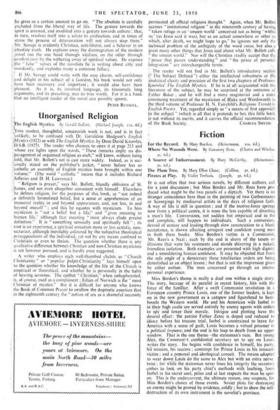Unorganised Religion
i he English Mystics. By Gerald Bullett. (Michael Joseph. r 2s. 6d.) I His modest, thoughtful, amateurish work is not, and is in fact iunlikely, to be confused with Dr. Geraldine Hodgson's English 'Mystics (1922) or with The English Mystics, by Dom David Knowles, psi). (1927). The reader who chances to open it at page 215 and whose eye lights upon the words, " These remarks imply no dis- liparagement of organised religion as such," will know, without being I hold, that Mr. Bullett's net is cast more widely. Indeed, as is sue- licinctly stated on the publisher's jacket, " never before has so l!catholic an assembly of English mystics been brought within one .i.volume." (The word " catholic " means that it includes Richard ifrJefferies and D. H. Lawrence.) :" Religion is prayer," says Mr. Bullett, blandly oblivious of St. Vames, and not even altogether consistent with himself. Elsewhere - 'tie defines religion, for the purposes of this book, as " not indeed it definitely formulated belief, but a sense or apprehension of an immortal reality in and beyond appearances, and, not less, in and beyond oneself " ; and this he equates with mysticism. To him mysticism is " not a belief but a life," and " gives meaning to human life," although that meaning " must always elude precise definition." It is " something sensually and spiritually felt " ; its root is an experience, a spiritual sensation more or less ecstatic, non- sectarian, although inevitably. -coloured by the subjective theological presuppositions of the individual, yet not by any means confined to Christians or even to theists. The question whether there is any qualitative-difference between Christian -and-non-Christian mysticism is not however pursued, and is hardly even suggested.
A writer who employs such well-thumbed clichés as "Church Christianity " or " popular pulpit-Christianity." lays himself open to the question whether his knowledge of the life of the. Church is empirical or theoretical, and whether he is personally in the habit of hearing. sermons. The epithet " Christian," when unhyphenated, is, of course, used as a compliment ; Julian of Noiwich is the " most . Christian of mystics." But it is difficult for anyone who knows the Book of Common Prayer to swallow the dogmatic assertion that in the eighteenth century the " notion of sex as a shameful necessity permeated all official religious thought." Again, when Mr. Bullett accuses " institutional religion " in the nineteenth century of having "taken refuge in an ' unseen world ' conceived not as being ' within us' (as Jesus said it was), but as an actual somewhere or other to Which, after death, we might hope to go;" he ignores not only the technical problem of the ambiguity of the word entos, but also.a great many other things that Jesus said about what Mr. Bullett c411s "the unseen world." Nor will the Christian readily accept that the peace that passes understanding " and " the peace of personal integration " are interchangeable terms.
;: The reader will not find in Mr. Bullett's introductory section (i` The Subject Defined ") either the intellectual robustness or ihe analytical clarity and precision of the first two chapters of ProfesiOr Knowles' The English Mystics. If he is at all acquainted with the literature of the subject, he may be surprised at the omission:of Father Baker ; and he will find a more magisterial and a miir: Convincing treatment of the mysticism of Blake and Wordsworth'In the third volume of Professor H. N. Fairchild's Religious Trendsric English Poetry. Yet, regarded simply as " a means of first approaet- tO the subject " (which is all that it pretends to be), this little bdok is not without its merits, and it carries the official recommendation


































 Previous page
Previous page